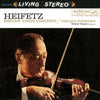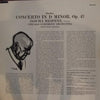



Jascha Heifetz & Walter Hendl - Sibelius - Violin Concerto in D Minor -
ORDER LIMITED TO ONE ITEM PER CUSTOMER
Jean Sibelius - Violin Concerto In D Minor, Op. 47 [click here to see more vinyl from Jean Sibelius]
Violin – Jascha Heifetz
Chicago Symphony Orchestra
Conductor – Walter Hendl
1 LP, standard sleeve
Limited edition
Original analog Master tape : YES
Heavy Press : 180g
Record color : black
Speed : 33RPM
Size : 12”
Stereo
Studio
Record Press : Quality Record Pressings
Label : Analogue Productions
Original Label : RCA Victor Red Seal
Recorded in 1959
Engineered by Lewis Layton
Produced by John Pfeiffer
Remastered by Ryan Smith at Sterling Sound
Plated by Gary Salstrom at QRP
Originally released in 1960
Reissued in 2015
Tracks :
Side A : First Movement: Allegro Moderato
Side B:
- Second Movement: Adagio Di Molto
- Third Movement: Allegro, Ma Non Tanto
Reviews :
“As we observe the 50th anniversary this month of the death of Jean Sibelius, his Violin Concerto in D minor op.47 is at the summit of the great concertos. It has succeeded in turning the ‘mighty four’ – Beethoven, Mendelssohn, Brahms and Tchaikovsky – into the mighty five. But it took a long time for the work to catch on in the 20th century, partly because Sibelius, himself a skilled violinist, gave fellow fiddlers a tough obstacle course. Even Jascha Heifetz – who in 1935, at the height of the Sibelius boom, was the first to record the concerto – couldn’t punch it into the repertoire. Perhaps Heifetz set such an unbelievably high standard that few dared to approach it. Indeed, it is possible to date the emergence of the Sibelius concerto into the standard repertoire from the point of Heifetz’s retirement in 1972.
Nowadays, with general technical standards at an all-time peak, almost everyone wants to play the Sibelius. The work seems to attract younger violinists in particular: it offers them numerous opportunities to flash their stuff. And conductors like it because there are many passages in which they and their orchestras can shine. The concerto also wears well because there is depth in the searching, brooding reflections of the icy Nordic landscape in the opening movement; because of the motoric rhythms that drive the outer movements; and because of the surging Romantic emotions of the climaxes in the second movement.
Yet 72 years on from the first recording, even as the performances on disc proliferate, Heifetz’s first recording still sets a near insurmountable benchmark. The concerto seems made-to-order for the Heifetz personality – the emotion shooting through every stroke that belied his impassive physical presence, the combination of what one critic called ‘fire and ice’ that suits this piece perfectly. Heifetz does indulge in a few portamentos, but there is not a hint of sentimentality. Thomas Beecham is propulsive and supportive, exploring the darkness of the orchestral writing as few others have since. Despite the less-than-full reproduction of the London Philharmonic Orchestra, there is still much to learn from this antique recording.
Heifetz tried the Sibelius again in stereo in 1959, almost pulling off a second benchmark. Although his tone is a bit thinner and his technique not quite as impervious as in 1935 (nor is Walter Hendl’s conducting as imaginative as Beecham’s), Heifetz’s violin still sings, exults, blazes and dominates. For instance, on both recordings he second-guesses the composer by extending the finale’s last ascending scale to the G beyond the written E flat, presumably for bravura effect. The tempos in his second recording are probably the fastest on record, cutting a minute off his first.” The Strad, December 2017
AllMusic
Discogs 4.63 / 5




